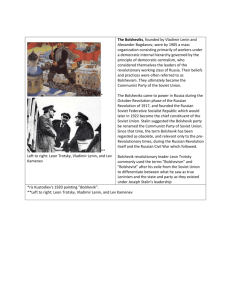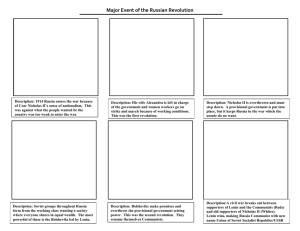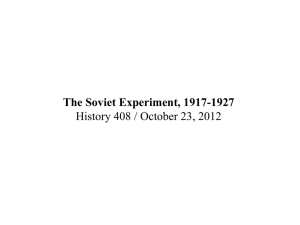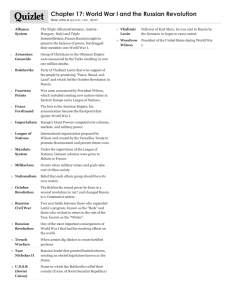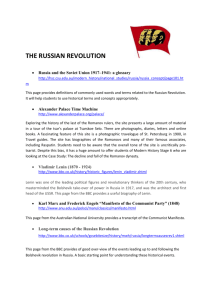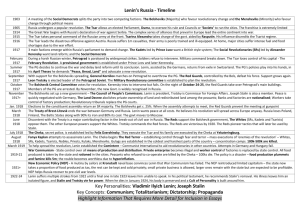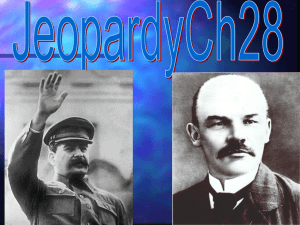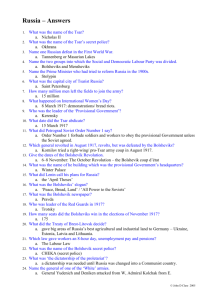Bread, Peace, and Land - White Plains Public Schools
advertisement
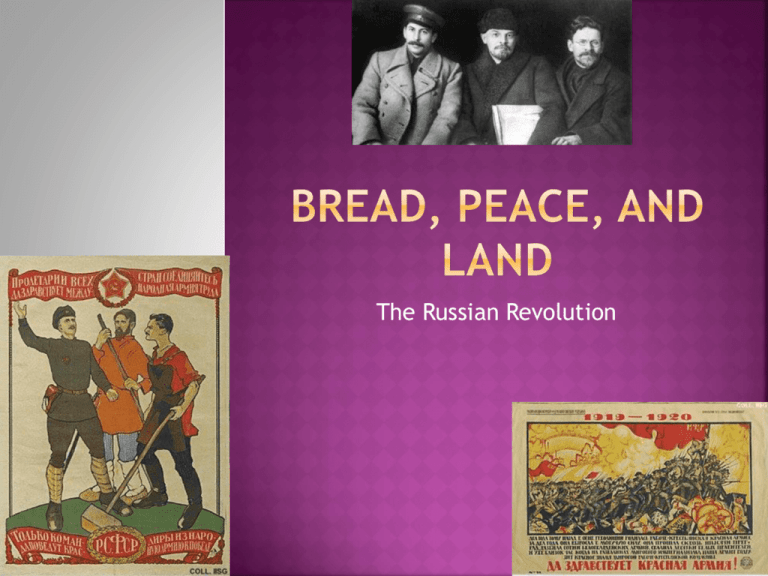
The Russian Revolution Of all the Great Powers in 1914, Russia was the least able to fight a prolonged war Although the country was rich in natural resources, industrialization remained far behind other major nations in Europe Russia’s political institutions were even weaker than its economy Tsar Nicholas II was supreme, and all cabinet members served at his pleasure The legislative body, the Duma, was packed with his cronies Nicholas’ wife, Alexandra, was German by birth, and throughout the conflict people suspected her of favoring the Central Powers In 1914, Russia was hardly prepared for war Just nine years earlier Russia had been defeated in a war with tiny Japan The Revolution of 1905, when revolts and uprisings had forced the Tsar to concede civil rights and a parliament to the Russian people, had also shaken the empire Russia's hopes were dashed early in the Great War At Tannenberg and the First Battle of the Masurian Lakes, in 1914, Russia lost two entire armies (over 250,000 men) Adding to losses on the front, a strange religious sectarian, Grigory Rasputin, had gained great influence over the royal family Through hypnosis, he was able to control the hemophilia of the Tsar’s son Alexandra was convinced that Rasputin enjoyed some divine power Actually, he disguised his real character, for he much preferred vodka to prayer Rasputin made both political and military decisions that did great harm to the prestige of the monarchy To be rid of him, in December 1916 a group of officers succeeded in shooting Rasputin and threw his body, not quite lifeless, into a river Despite many obstacles, the Russian army fought well in the first months of the war Then serious shortages of munitions developed Many of its junior officers died because tradition demanded that they lead the troops in an attack In June 1917 General Alexander Brusilov launched an offensive on the eastern front The Russian general staff planned that it should force the Austro-Hungarian army out of the war However, the Habsburg armies did not disintegrate Discouraged at their failure, many Russian soldiers decided that they had enough of the war, and they went back to their villages As Russia’s military capacity disintegrated, the capital, with its new name Petrograd, filled with rumors of treason and corruption There was nothing in the stores and nothing in the shops to buy; there was no work for the workers in the factories In March 1917 a riot broke out when people demanded food, and army units, called in to suppress the rioters, joined them Russian generals sent a message to the tsar: to restore confidence he must abdicate Reluctantly Nicholas complied In Petrograd the capital’s military and civil servants, doctors, lawyers, and professionals set up a Provisional Government Unfortunately, those who set policy for the Provisional Government believed the war could still be won They refused to recognize that the situation was hopeless From the very moment of its creation, the Provisional Government had to share power with councils, soviets, that sprung up in Petrograd The leaders of the soviets were inspired by Marxist doctrine They recognized the possibility that the sorry state of the nation opened a window of opportunity for putting that doctrine into practice The soviets formed a government with its own officials, the Petrograd Soviet of Workers and Soldiers Deputies But not all was peace and harmony within the Soviet The majority were members of the Social Revolutionaries, but other smaller groups existed Their size did nothing to keep them quiet The Bolsheviks were one faction of the Social Democrats Mensheviks made up the other wing of the party Ironically bolshevik means the majority and menshevik, the minority, but in actual numbers the Bolsheviks were the smaller of the two When the war started, most Bolshevik leaders were in jail or in exile They drifted back to Russia as soon as the Provisional Government came to power The most prominent of the Bolshevik leaders were Nikolai Lenin and Leon Trotsky Both Lenin and Trotsky planned to bring about a socialist revolution now While others wrangled and debated endlessly what should be done, the Bolsheviks urged immediate action That action contained three elements: peace at once, bread for everyone, and land to the peasants For millions of Russians, the Bolshevik program seemed to offer a solution to the chaos and military that beset their country After one more failed offensive ordered by the Provisional Government, the Bolsheviks were ready to act On November 7, 1917, the Red Guards, the military arm of the Bolsheviks, burst through the gates of Petrograd’s Winter Palace, scattering the Provisional Government’s officials to the wind Said Lenin, “I feel dizzy” With the government now in his hands, Lenin had to deliver on the promises He contacted the Germans with a promise that Russia was ready to talk peace The two sides met at the border town of Brest-Litovsk The Bolsheviks negotiator was Trotsky When the Germans presented their demands, they stunned Trotsky by demanding that Finland, the Baltic states, Belarus, Poland, Ukraine, and Bessarabia become independent In agreeing to these terms, Bolshevik Russia would have to start its existence with the loss of a third of its population and farmland, a fourth of its railroads, four-fifths of its iron ore, and 90% of its coal production Trotsky believed that these terms were so harsh that he refused to sign a treaty with the comment that “There will be neither war nor peace” He returned to report to the Bolshevik leadership After months of debate, for Lenin was convinced that Russia had to have peace no matter the price, the Bolshevik government signed the Treaty of Brest-Litovsk Russia’s travail was not over The Bolsheviks were only a small minority among the population as a whole Other parties resented Lenin’s high-handed operations and began to resist Generals and their armies, once loyal to the tsar, were unlikely prospects for recruitment to the Bolshevik cause Liberal democrats, members of the Social Revolutionary Party, Orthodox churchmen, and a host of others openly urged the overthrow of the Bolshevik regime Russia plunged into civil war The contest was between the Bolshevik government and its Red Army, organized by Trotsky, and the Whites, the opposition Outside Russia, the Allied governments viewed events with great apprehension First, Russia had withdrawn from the war, easing the pressures on Germany because it no longer was required to fight a two-front war Second, the prospect of a nation as large as Russia in the hands of revolutionaries appeared truly frightening On the excuse that military supplies might be diverted to the Germans, troops of Britain, France, the United States, and Japan took up positions in Russian port cities Foreign intervention in the civil war gave Lenin the excuse he needed to brand his enemies as traitors to Russia Allied intervention, meant to strengthen the whites, ended up a burden Both Red and White armies fought with appalling ferocity Anyone thought to be on the side of the enemy was arrested, imprisoned, and frequently shot The tsar and his family suffered that fate Nicholas, Alexandra, and their children were placed under house arrest and then executed, on the suspicion that they might try to escape The new state of the Union of Soviet Socialist Republics now appeared It was the work of Nikolai Lenin and his Bolshevik Party In 1921 the party took the name Communist Soon this state became the most totalitarian nation in all Europe By 1921 the Communists routed their enemies on the battlefield The White forces, never able to work together, collapsed before the communist Red Army Because Lenin knew well that there was still a great deal of opposition to Communist rule, he gave the secret police, the Cheka, a free hand to search out dissenters The result was mass executions, imprisonment of tens of thousands, and the flight of millions Such was the fate of all whom the Communists defined as counterrevolutionaries Similar to the Fascists in Italy, the party made policy, and the government simply carried out its decisions In the Soviet Union, however, the terror and efficiency of the Communists far surpassed the Fascists at their worst The Russian Orthodox church lost all its property, and its patriarch was jailed Its bishops were executed or sent to Arctic labor camps, and its priest were denied citizenship Political leaders of prewar Russia suffered the same fate All Soviet life came under the management of the state Workers and farmers were enlisted into communist-led organizations Ironically, Soviet legislation forbade strikes, although according to Marxist theory, the factory worker was the supreme model of the new Soviet man and woman Lenin dominated the executive committee of the party, as head of the Politburo As long as Lenin was alive, no one dared challenge him In 1923, however, Lenin suffered a stroke, allowing the more ambitious members of the Politburo to jockey for the succession After his death, a year later, it seemed probable that Leon Trotsky would be next in line But even though Trotsky made speeches and wrote articles for the newspapers, a rival, Josef Stalin, slowly but surely gained support Stalin’s attention focused on the local level, placing his partisans in key positions throughout the nation When a showdown took place, the victor was Stalin Trotsky went into exile, and in 1940 one of Stalin’s agents murdered him Lenin had shown that he could be flexible when he saw the post-civil-war economy in shatters In what was known as the New Economic Policy, Lenin allowed farmers to sell their produce on the market and permitted small private entrepreneurs to run their own businesses By 1927, the Soviet Union had fully recovered from its wars But Stalin was different Stalin, on the other hand, felt compelled to follow Marxist prescriptions for a socialist society In 1928 he launched the first Five Year Plan, in which he intended to industrialize the manufacturing sector of the country completely and to collectivize its agriculture The price paid for Stalin’s orthodoxy was unbelievably severe Landowning peasants, the kulaks, preferred death to giving over their livestock and grain The army obliged them Millions were killed; even more were deported to labor camps Resistance was especially strong in Ukraine, so that the peasants here suffered disproportionately One estimate is that, overall, some 14,000,000 died or were exiled to labor camps in Siberia By destroying the productive kulaks, famine ravaged the land The impassive Stalin, immune to human suffering, made no concessions As long as he controlled the army and secret police, he felt omnipotent In the 1930s an increasingly paranoid Stalin launched what became known as the Great Purge in which anyone suspected of dissent was either shot or sent to a labor camp The true numbers may never be known, but some historians estimate that ten million people were sent to the string of labor camps, later called the Gulag Archipelago by the writer Solzhenitsyn Millions died in the brutal conditions – including one quarter of the communist Party itself
